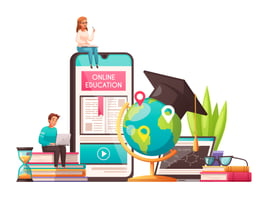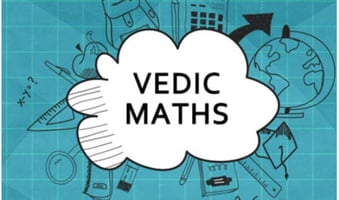Ever since the coronavirus pandemic broke out in 2020, it has taken the world by storm. All parts...
How Technology is Transforming Math e-learning for the better?
Technology has brought about revolutionary shifts and has transformed almost every area of human life today. Learning and education is one such sector that has witnessed a major evolution through technology. E-learning is now adapted as the most convenient and common mode of study with great benefits. The modernization of education from ancient scripts to online math classes or online math tuition spans a long journey. This shift is highly apparent during the ongoing times of pandemics. In tough pandemic times where social distancing and safety norms kept the entire education system standstill, e-learning ensured that learning never stopped for anyone, despite the barriers and restrictions.
Technological interventions have always gained much appreciation in various sectors of human existence. However, learning and education have not realized the full potential of technology until now. With the acceptance of e-learning and online classes as a common mode of study, education researchers, students, teachers, and parents have begun to weigh its pros and cons. Talking about the benefits, it has been seen that ‘e-learning’ can work great in warding off various fears from students’ minds. It is especially beneficial for students who learn better at their own pace.
Engaging and interactive media allows maths concepts to come alive as easy to process information. The use of audio-visuals has proven to be beneficial in the cognitive process long ago. But with efficient e-learning, this is becoming a reality for a large number of students. While technology is pioneering a new age of learning, we look closely at how it is transforming maths learning for the better.
Blog Contents
Understanding and addressing the mathematical challenges
One of the key positive shifts is that online math classes or maths tuition using the LMS education or e-learning platform is shifting the goal of the students from just producing the right answers to understanding the concepts and addressing the mathematical challenges. Problem-solving has been taken to the next level by gamification of the mathematical problems and allowing students to use their brains in the best possible manner to creatively solve them while enjoying them simultaneously. This shift is surely well-appreciated by many education researchers and mathematicians as it is working towards eliminating the grasp and pour method where students would mug up the formulas and execute step-by-step solutions like a machine without using their brains creatively to their full potential.
About a decade ago, in 2008, Miller wt al. highlighted the problem of appropriate technology choices for education. He asserted the appropriate choice of software for the success of educational technology. Today, various Learning Management Systems have incorporated many different ways of innovating online math classes to ace the race to become the prominent learning management systems for schools during these pandemic times. In addition, private institutions have incorporated their own LMS blackboard to adapt to the new era of online teaching.
However, Miller’s point of the appropriate choice of software or technology for the success of educational technology remains relevant in these times where almost every institution is using the LMS or ‘elearning platform’ for teaching but differs in the choice of technology or software that they use. This is the choice that sets them apart and triggers a new competition in the education, precisely, the elearning industry.
One of the important points to be considered while making the right choice of software or technology for elearning is selecting the software package based on its relevance to lessons rather than just the visual appeal. While visual learning is beneficial, it must also pertain to the right subject matter and be relevant to the learning goals.
Customizable maths e-learning through technology
LMS education and private ‘math tutor’ are preferred go-to options for parents who want their children to learn mathematics with more interest and understanding. One-on-one interaction, combined with the power of technology, can help achieve various learning goals for various mindsets more effectively than the traditional way of teaching. Numerous reports claiming how online math classes or elearning platforms are helping students to score better testifies this statement.
With better access to technology for math, students may have a more personalized learning experience. Because no two students are the same, technology can assist individual students in finding information and resources tailored to their specific requirements. Children may see lessons, private math tutors and tutorials, ‘LMS blackboard’, and other instructional resources on their own devices and at their speed. So, if one student is still stumped on a topic while another is ready for a new challenge, LMS education through technology may help each of them take the next logical step.
Technology has transformed the maths classrooms with the internet.
The ongoing trend for LMS education in online mathematics addressed major issues like online community and teacher networks, the sustainability of these communities, knowledge-building techniques in interactive workgroups via technology, and online teacher-student-parents interactions. These issues sparked new theoretical discoveries as well. Since the latest reports, the exponential growth of interactive digital devices and the use of the internet in teaching mathematics and creating an online learning environment support the need to define some of these global education projects.
The influence and intervention of social media in the global education system is expanding, shifting the education process from a “push” to a “pull” (student-centred) approach based on the student, in which students are a vital part of many aspects of the process.
As we know, the classroom might change completely in this evolution process, from a physical location with fixed borders to a virtual environment with several components possibly selected by the student instead of the teacher. Mobile technology is being expanded by mobile technologies, ‘learning management systems’ for schools, digital learning objects and other artifacts to modify the classroom such that it is difficult to acknowledge. It now becomes evident that the concept of the classroom being ‘deconstructed’ by digital technology.
Content-specific pedagogy – A challenge for teachers for online math classes
In particular, teachers must know the pedagogical material or Pedagogical Content Knowledge, an understanding of best practices unique to Mathematics to build technology-infused experiences that facilitate active online mathematical learning.
The Technological Pedagogical Content Knowledge (TPACK) framework is a way for a teacher to examine the efficiency of technical integration for “online math classes”. This tool encourages the thoughtful consideration of teachers on pedagogy, content and technology, not just as independent entities but as cross-referenced fields.
In the math classroom, both content-specific and content-neutral technology can yield great results. For example, research shows that content-specific applications and websites that focus on mathematics learning or online “maths tuition” using virtual interaction are very successful and are more efficient than traditional learning.
We can agree upon the fact that the technological interventions in education in the form of online math tuitions or learning management systems for schools is benefiting and also allowing students to seek new possibilities to debate mathematics, create and link graphics, analyze models, detect trends and generalize various concepts at their own pace. This transformation in mathematical teaching can greatly shift student’s focus from getting the right answer to understanding and addressing the mathematical challenges in real life. Hence, technology has a great potential to transform math elearning for the better.
.png?width=100&height=100&name=Kapdec%20Logo%20(400px).png)


